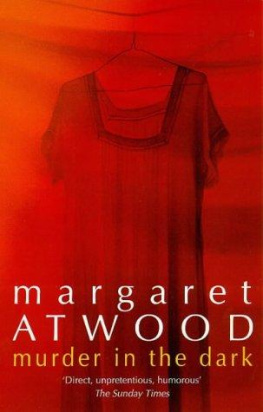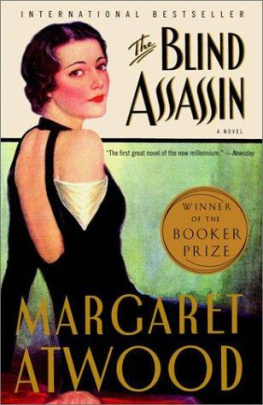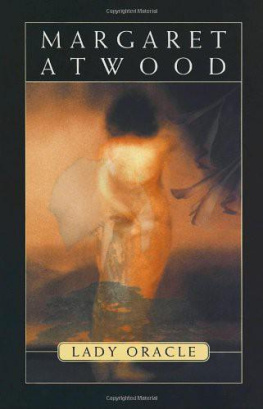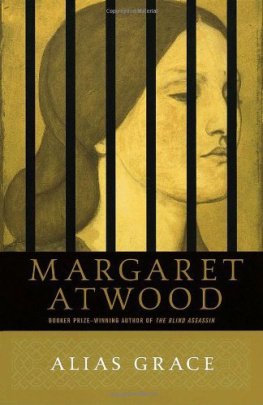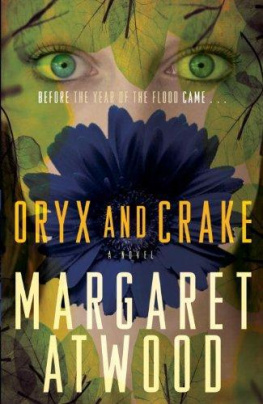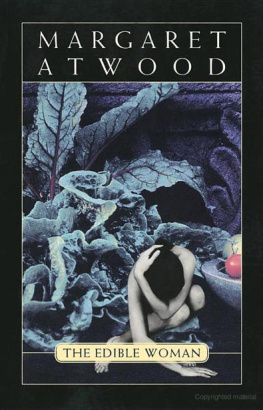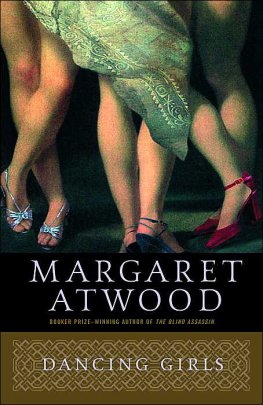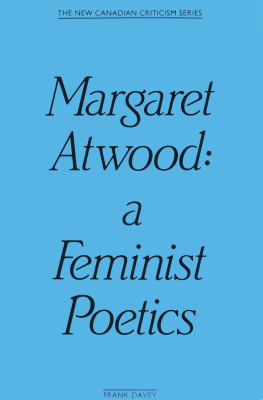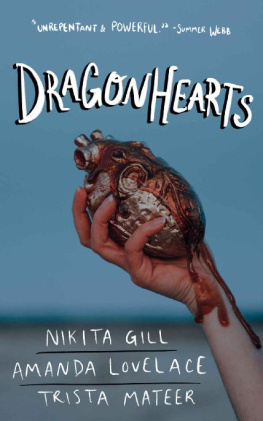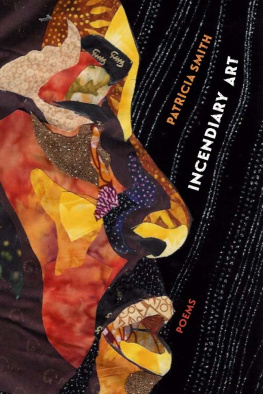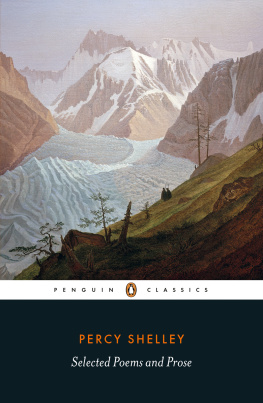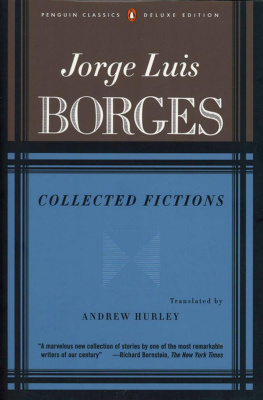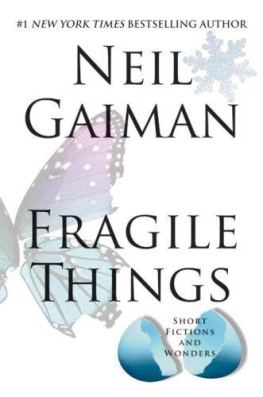Margaret Atwood
MURDER IN THE DARKShort Fictions And Prose Poems
First Published in 1983
Contents
I.
Autobiography
Making Poison
The Boys Own Annual
Before the War
Horror Comics
Boyfriends
The Victory Burlesk
Fainting
II.
Raw Materials
III.
Murder in the Dark
Simmering
Womens Novels
Happy Endings
Bread
The Page
IV.
Mute
She
Worship
Iconography
Liking Men
Strawberries
Him
Hopeless
A Parable
Hand
Everlasting
Instructions for the Third Eye
I.
AUTOBIOGRAPHY
The first thing I can remember is a blue line. This was on the left, where the lake disappeared into the sky. At that point there was a white sand cliff, although you couldnt see it from where I was standing.
On the right the lake narrowed to a river and there was a dam and a covered bridge, some houses and a white church. In front there was a small rock island with a few trees on it. Along the shore there were large boulders and the sawed-off trunks of huge trees coming up through the water.
Behind is a house, a path running back into the forest, the entrance to another path which cannot be seen from where I was standing but was there anyway. At one spot this path was wider; oats fallen from the nosebags of loggers horses during some distant winter had sprouted and grown. Hawks nested there.
Once, on the rock island, there was the half-eaten carcass of a deer, which smelled like iron, like rust rubbed into your hands so that it mixes with sweat. This smell is the point at which the landscape dissolves, ceases to be a landscape and becomes something else.
MAKING POISON
When I was five my brother and I made poison. We were living in a city then, but we probably would have made the poison anyway. We kept it in a paint can under somebody elses house and we put all the poisonous things into it that we could think of: toadstools, dead mice, mountain ash berries which may not have been poisonous but looked it, piss which we saved up in order to add it to the paint can. By the time the can was full everything in it was very poisonous.
The problem was that once having made the poison we couldnt just leave it there. We had to do something with it. We didnt want to put it into anyones food, but we wanted an object, a completion. There was no one we hated enough, that was the difficulty.
I cant remember what we did with the poison in the end. Did we leave it under the corner of the house, which was made of wood and brownish yellow? Did we throw it at someone, some innocuous child? We wouldnt have dared an adult. Is this a true image I have, a small face streaming with tears and red berries, the sudden knowledge that the poison was really poisonous after all? Or did we throw it out, do I remember those red berries floating down a gutter, into a culvert, am I innocent?
Why did we make the poison in the first place? I can remember the glee with which we stirred and added, the sense of magic and accomplishment. Making poison is as much fun as making a cake. People like to make poison. If you dont understand this you will never understand anything.
THE BOYS OWN ANNUAL, 1911
was in my grandfathers attic, along with a pump organ that, contained bats, rafter-high piles of Western paperbacks, and a dress form, my grandmothers body frozen in wire when it still had a waist. The attic smelled of dry rot and smoked eels but it had a window, where the sunlight was yellower than anywhere else, because of the dust maybe. This buttery sunlight framed the echoing African caves where the underground streams ran, lightless, haunted by crocodiles, white and eyeless, guarding the entrance to the tunnel carved with Egyptian hieroglyphs and armed with deadly snakes and spiky ambushes planted two thousand years ago to protect the chamber of the sacred pearl, which for some reason, in stories like this, was always black. And when the hero snatched it out of the stone forehead looming bulbous and idolatrous there in the darkness, filthy was a word they liked, for other religions, the goddess was mad as blazes. Sinister priests with scimitars abounded, they could sniff you out like bloodhounds, their bare feet making no sound, until suddenly there was a set piece and down the hill went everyone, bounding along, loving it, yelling like crazy, bullets thudding into bodies into the scrub, into the surf, onto the waiting ship where Britain stood firm for plunder.
The issue with the last instalment had never come; it wasnt in the attic. So there I was, suspended in mid-story, in 1951, and there I remain, sometime, waiting for the end, or finishing it off myself, in a booklined London study over a stiff brandy, a yarn spun to a few choice gentlemen under the stuffed water buffalo head, a cheerful fire in the grate, or somewhere on the veldt, a bullet in the heart, who can tell where such greedy impulses will lead? Such lust for blind white crocodiles. In those times there were still chiefs in ostrich feathers and enemies worth killing, and loyalty, or so the story said. Through the attic window and its golden dust and flyhusks I could see the bam, unpainted, hay coming out like stuffing from the loft doorway, and around the comer of it my grandmothers cow. Shed hook you if she could, if you didnt have a pitchfork. She was sneaking up on someone invisible; possibly my half uncle, gassed in the first war and never right since. The books had been his once.
BEFORE THE WAR
In the old days, before the war, things were different. You could walk out to the end of the dock any day around five and cast a couple of times and there would be your walleye, for supper or breakfast, hang it all night from a tree branch so the bears wouldnt get it, there were more bears then, theyd hang around the logging camps, you could go to the garbage dumps in the evenings and shoot them, I knew a man used a bow and arrow, not so good if you missed, more like real hunting though, hed follow the trail of blood into the woods. They dont have logging camps now, not the way they used to, in winter, with horses to drag the trees to the ice, then in spring theyd tow them, in a boom, shoot them downriver to the sawmill. It was swede saws and a double bitted axe, you cant get a good one any more, once they forget how to make them itd take you years to teach anyone and there isnt the demand. They use trucks and bulldozers now, go in and level the place, hell of a mess, stumps and dead branches everywhere and no fish left to speak of, they fly in anyway now, in planes, somethings happened to the Indians too, they never used to drink in the bush, it was always whites drank in the bush and the Indians drank in town, the bush was too important for them to take the risk of getting drunk in it, too drunk and you set a fire. In those days every man turned out to fight a fire, if there was one you turned out. In a wind it would jump the crowns, cross islands even. Youd work, youd sweat for days without sleep to stop that fire.
Now they set them on purpose to get the work. Nobody cares, its just a place to chew up the water with your speedboat on the weekends. It was wooden boats they made themselves and a five horsepower motor, in the old days before the war.
The sun goes down, in the west as always, peach-coloured clouds, theres a shiver. It feels like waiting, but it isnt. Not a sound but the wind, the soft trickle of the small waves under the dock. Theres no one here. One step off the path and theres never been anyone here, you think perhaps wrongly that it could all still be saved, even now. This is the old days. This is before the war.
HORROR COMICS
When I was twelve my friend C. and I used to pinch horror comics from the racks in drugstores. They were only ten cents then. We would read them on the way home from school, dramatizing the different parts, in radio voices with sound effects, to show we were above it. The blood was too copious and lurid, the faces were green and purple, the screams overdone. We leaned against the low stone wall outside the funeral home, laughing so much that C, whose mother said she should never use the school toilets for fear of catching some unspecified disease, had to cross her legs and beg me to stop.
Next page
